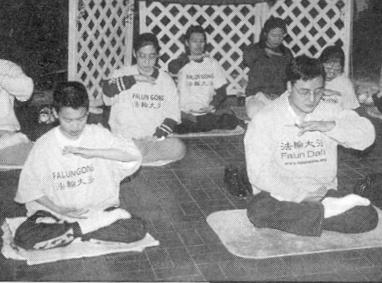Synchronicity: Falun Gong: A Cultivation of the Heart
Issue 45, February/March 2001 Alberta's Magazine for Body, Mind
 Falun Gong, or
Falun Dafa as it is also known, is a practice that goes one step further
than Tai chi and Qigong.
Like those two ancient Chinese arts, its helps cultivate mind and body,
improving one's health in the process. There is a third element to Falun
Gong, though, an element not always sought in Tai Chi Chuan or Qigong, at
least not explicitly.
Falun Gong also seeks to develop a deepened spiritual awareness. This
development is based on developing one's heart in accordance with three
principles: Zhen, Shan and Ren. Zhen is truth, or a return to one's True
Self; Shan is benevolence or compassion; Ren is forbearance or tolerance.
If these principles are followed, the ultimate result will be the
aligning of oneself with the essence of the Universe.
The practice was introduced to the public in 1992 in China, and has
spread around the world, to other areas of Asia, North America, Australia,
and Europe.
In Calgary, practitioners gather Saturday and Sunday mornings to learn
and practice the art. During the summer, free sessions take place on
Prince's Island Park. During winter, the sessions move indoors to the
Devonian Gardens.
Like Tai chi and Qigong, Falun Gong uses a set of exercises to help
practitioners achieve this goal. Falun Gong instructor Kai Liu says the
exercises help "the development of Xinxing, or "Heart/Mind
nature." He adds that "cultivating Xinxing also involves giving up
negative behaviors, releasing unhealthy attachments and following the
principles of truth, benevolence and forbearance."
One of the main features of Falun Gong that distinguishes it from that of
the other two similar practices is the generation of energy.
In Tai Chi and Qi Gong, practitioners are taught to focus on the dan tian,
or energy center of the body, while performing their mediations and
exercises. They visualize the center as a glowing, spinning ball, that,
through the act of dan tian breathing, increases in color and speed of spin.
As the color and speed intensify, the practitioner's energy also
intensifies.
That, however, requires conscious effort. Practitioners of Falun Gong can
eliminate the need of conscious effort.
"Once you begin practicing Falun Gong, your energy cycle is engaged
and can produce energy without conscious effort," says Liu. "It
works all the time, even when you are sleeping. In Tai Chi and Qi Gong, you
have to consciously work at generating it."
Although Falun Gong [...] seeks to help practitioners achieve a deeper
spiritual awareness, it is not connected to any specific religion or faith.
"It is open to anyone, of all ages, and all spiritual beliefs,"
says Liu.
Like Qi Gong and Tai Chi, the practice can takes as much time as an
individual wants to invest in it.
Falun Gong, or
Falun Dafa as it is also known, is a practice that goes one step further
than Tai chi and Qigong.
Like those two ancient Chinese arts, its helps cultivate mind and body,
improving one's health in the process. There is a third element to Falun
Gong, though, an element not always sought in Tai Chi Chuan or Qigong, at
least not explicitly.
Falun Gong also seeks to develop a deepened spiritual awareness. This
development is based on developing one's heart in accordance with three
principles: Zhen, Shan and Ren. Zhen is truth, or a return to one's True
Self; Shan is benevolence or compassion; Ren is forbearance or tolerance.
If these principles are followed, the ultimate result will be the
aligning of oneself with the essence of the Universe.
The practice was introduced to the public in 1992 in China, and has
spread around the world, to other areas of Asia, North America, Australia,
and Europe.
In Calgary, practitioners gather Saturday and Sunday mornings to learn
and practice the art. During the summer, free sessions take place on
Prince's Island Park. During winter, the sessions move indoors to the
Devonian Gardens.
Like Tai chi and Qigong, Falun Gong uses a set of exercises to help
practitioners achieve this goal. Falun Gong instructor Kai Liu says the
exercises help "the development of Xinxing, or "Heart/Mind
nature." He adds that "cultivating Xinxing also involves giving up
negative behaviors, releasing unhealthy attachments and following the
principles of truth, benevolence and forbearance."
One of the main features of Falun Gong that distinguishes it from that of
the other two similar practices is the generation of energy.
In Tai Chi and Qi Gong, practitioners are taught to focus on the dan tian,
or energy center of the body, while performing their mediations and
exercises. They visualize the center as a glowing, spinning ball, that,
through the act of dan tian breathing, increases in color and speed of spin.
As the color and speed intensify, the practitioner's energy also
intensifies.
That, however, requires conscious effort. Practitioners of Falun Gong can
eliminate the need of conscious effort.
"Once you begin practicing Falun Gong, your energy cycle is engaged
and can produce energy without conscious effort," says Liu. "It
works all the time, even when you are sleeping. In Tai Chi and Qi Gong, you
have to consciously work at generating it."
Although Falun Gong [...] seeks to help practitioners achieve a deeper
spiritual awareness, it is not connected to any specific religion or faith.
"It is open to anyone, of all ages, and all spiritual beliefs,"
says Liu.
Like Qi Gong and Tai Chi, the practice can takes as much time as an
individual wants to invest in it.